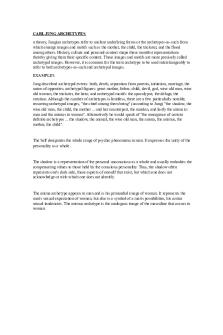Carl Jung - Lecture notes 3 PDF

| Title | Carl Jung - Lecture notes 3 |
|---|---|
| Author | Monica Stegall |
| Course | Personality |
| Institution | Colorado Mesa University |
| Pages | 3 |
| File Size | 112.6 KB |
| File Type | |
| Total Downloads | 89 |
| Total Views | 150 |
Summary
The chapter is about Jung's theory and how it correlates to personality. ...
Description
Carl Jung 9-26-2019 & 10-1-2019
Non-conventional theorist Joined the Vienna circle (Freudian circle) o Meet weekly to share ideas and theories. o Freud saw him as the new generation. Traveled to the U.S with Freud o Clarke University in New Hampshire o Falling out on journey about sexual theory (sexual energy) Jung was kicked out of the circle. Traveled all across the world. Influenced his theory. Holism in his theory along with religion and cultures/ Goal to make the unconscious, conscious. o Bottom pit of cravings and threatening memories and fear. o Unconscious and sexual energy (Freuds goals, not Jung). Really discovered practiced religion across the world. Jung’s quote of Learning psychology o Learn next to nothing from experimental psychology. o Advise to abandon exact science. o Focus on human and feelings, actions, cultures. Hermetics (Jung’s Theory) o Subjective o Non-conventional o Non-linear time o Formal/final causation o Dialectical logic o Rationalism
Ying Yang Balance between light and dark. Dialectical logic – meaning different alternatives/operationalization o Meanings are bipolar o Issues arise when demonstrative thinking begins. o Jesus Christ o When we are one-sided, we move into unconscious. Causes illnesses.
Personal Conscious Ego o Overt personality o Subjective awareness o How we think about ourselves. Repressed Unconscious Shadow (ID) o Once conscious contents which have been forgotten or repressed. Embrace the shadow
Collective Conscious Mask o Social role, how we act in situations. o Identities we assume because of socially prescribed roles. o Is taught social roles. Unconscious Archetype (important with theory) o Storehouse of ancestral experiences back to the dawn of time of humankind and is common to all humans. o Universal o Born and developed at birth.
Personal – do things for oneself, behavior. Collective – behave for the sake of others. ID can work in communion in conscious. o How we find true self. Social (cognitive) dissonance is repressed.
Archetype (preexistent) Forms are innate and present psychic predispositions (rationalism) that leads to respond to world in certain ways. Shadow (main archetype) Personifying o Female and male are us o Born bi-sexual o Anima – representation of women o Animus – representation of man Transforming o “The squaring of the circle, which forms the basic pattern of our dreams and fantasies, but it is distinguish y the fact that it is one of the most important for them from the functional point of view, archetype of wholeness” – Jung Fundamental emotions o Universal Love o Universal Death o Skull o Universal
Jung has lucid dreams or “vision” that he would record Dreamed of blood-filled rivers and internal winter (during World War I) Archetypes telling him something 1913-1928: painful exploration of himself. Synchronicity (non-scientific & non-conventional) Archetype that may manifest itself one’s experience and of the same time in an external event. “Way of aligning person’s thoughts with action.” Formal causal Not causally related (things tied together) Meaningful co-incident o Example: when someone says something as the same time. Thinking about someone so you both end up calling each othr at the same time. Right time, right place, right people. Attitudes A readiness of the psyche to act or react in a certain way (habitual or situational way). o General attitudes A conversion of personality types video o Introversion: Jung was first to create this type of attitude. o Extraversion: how we behave in a situation. o When we get our attitude profile, Jung says to not follow it. Rational way of thinking, we can go both ways. General attitudes o Feelings o Intuition o Thinking o Senescing o We have access to rational reality. How a personal becomes ill Complex: mental contents in the psyche that sticks together and take up space in the personal unconscious (shadow). o Final causal because of the combination of feelings and attitudes. Balance needs to be in harmony. If not, stuff is pushed down to the shadow. Dialectical: for every complex, there is a counter complex....
Similar Free PDFs

Carl Jung - Lecture notes 3
- 3 Pages

Carl Jung - Lecture notes 1
- 5 Pages

Carl Jung biografía
- 6 Pages

Carl Jung homework
- 5 Pages

CARL JUNG aportes
- 1 Pages

CARL Gustav JUNG - Mappa su Jung
- 1 Pages

Teoría analítica de Carl Jung
- 7 Pages

Carl Jung y el tarot
- 274 Pages

Sigmund Freud y Carl Jung
- 3 Pages
Popular Institutions
- Tinajero National High School - Annex
- Politeknik Caltex Riau
- Yokohama City University
- SGT University
- University of Al-Qadisiyah
- Divine Word College of Vigan
- Techniek College Rotterdam
- Universidade de Santiago
- Universiti Teknologi MARA Cawangan Johor Kampus Pasir Gudang
- Poltekkes Kemenkes Yogyakarta
- Baguio City National High School
- Colegio san marcos
- preparatoria uno
- Centro de Bachillerato Tecnológico Industrial y de Servicios No. 107
- Dalian Maritime University
- Quang Trung Secondary School
- Colegio Tecnológico en Informática
- Corporación Regional de Educación Superior
- Grupo CEDVA
- Dar Al Uloom University
- Centro de Estudios Preuniversitarios de la Universidad Nacional de Ingeniería
- 上智大学
- Aakash International School, Nuna Majara
- San Felipe Neri Catholic School
- Kang Chiao International School - New Taipei City
- Misamis Occidental National High School
- Institución Educativa Escuela Normal Juan Ladrilleros
- Kolehiyo ng Pantukan
- Batanes State College
- Instituto Continental
- Sekolah Menengah Kejuruan Kesehatan Kaltara (Tarakan)
- Colegio de La Inmaculada Concepcion - Cebu





![[Theories of Personality] Chapter 4 Carl Jung](https://pdfedu.com/img/crop/172x258/xdz8yk621k9e.jpg)
